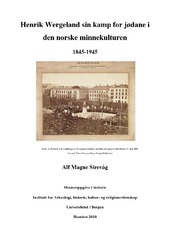| dc.description.abstract | This master thesis examines the presentation of the struggle of Henrik Wergeland to grant the Jews access to Norway in the Norwegian memorial culture. The Norwegian constitution prohibited Jewish access, and Wergeland worked very hard to undo this prohibition. Because memorial cultures always are constructed and selective, they may be examined to get information about the participants in them, among other things about what they identified with. Wergeland is probably the biggest Norwegian national hero, and national heroes are heavily used to mould national identities. So what is examined is the relationship of the Norwegian nation to what Wergeland did for the Jews, and furthermore whether or not this was a part of the Norwegian national identity. The examination covers the period from the death of Wergeland, in 1845, to the end of the occupation of Norway during the Second World War, in 1945. It does however not cover every year from 1845 to 1945, but rely instead on especially interesting sources, such as celebrations of the memory of Wergeland with a national significance. The examination suggest that the struggle of Wergeland for the Jews was included in the Norwegian memorial culture during the whole period from 1845 to 1945, and furthermore that it had a central position during most of these years. The focus was however probably small during the period from around 1910 to around 1935. Wergeland was furthermore mainly presented as a liberal freedom fighter during the whole period, which his work for the Jews suits well together with. The focus on this work did however not go entirely uncontested. The ones who were against to let the Jews into Norway was the first ones to pose an opposition, and later the anti-Semites made their own presentation of the struggle of Wergeland for the Jews. The opposition were however not at all successful, it was throughout extremely marginal. This means that the struggle for the Jews was a part of the Norwegian national identity. The Norwegian nation identified itself with being a liberal fighter for freedom, and as a part of this, it identified with the struggle of Wergeland to grant the Jews access to Norway. | en_US |
